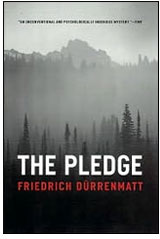Books |
The Pledge
Friedrich Dürrenmatt
By
Published: Jan 26, 2009
Category:
Fiction
When you give your “word”, what is it worth?
What if you gave your “word” — and had to make good on it?
What if your “word” actually cost you something?
These aren’t the questions you usually ask yourself when you’re reading a detective novel, but The Pledge is not a by-the-numbers policier and Friedrich Dürrenmatt is not like our current crop of crime novelists — Patricia Cornwell, I’m talking about you — who create a successful main character and put her through more or less the same paces in book after book.
Friedrich Dürrenmatt (1921-1990) was a Swiss writer usually remembered for his plays. (You may have seen The Visit.) He had strong, original views — “Shakespeare’s plots are sometimes weak, just clothesline to hang beautiful verse on; I prefer tightly structured pieces” — and when he turned his hand to fiction, “tightly structured pieces” were what he wrote. Which may be why “The Pledge” has been the inspiration for six movies since its publication in 1958.
Oh…The Pledge. The Jack Nicholson movie, with Benicio Del Toro and Robin Wright? Yes, that one. Directed by Sean Penn. One of Nicholson’s best, least-mannered performances, so you stayed with it. And though the film was moody, with an unsettling plot and a conclusion that didn’t nearly qualify as a happy ending, it haunted you for days, didn’t it?
The book is even better. 172 pages — you can read it on a plane trip, or in a single evening. And if you start it, you will finish it that very day, because it has no flights of style, no digressions. It’s that rare novel: a pure story.
Indeed, it’s told as a story. An unnamed detective novelist gives a lecture on his craft in a small Swiss city. Later that evening, in a bar, he meets Dr. H. — “the former police chief in the canton of Zurich” — who offers him a ride to Zurich the next morning. In the car, they stop at a gas station. As they drive, Dr. H. mocks detective novels:
You set up your stories logically, like a chess game: here’s the criminal, there’s the victim, here’s an accomplice, there’s a beneficiary; and all the detective needs to know is the rules, he replays the moves of the game, and checkmate, the criminal is caught and justice has triumphed. This fantasy drives me crazy. You can’t come to grips with reality by logic alone.
And then Dr H. proceeds to tell a story about the owner of that gas station. “That pathetic drunken wreck” — his name is Matthai — was once his best detective, “a genius”. He never married. He seemed to have no passion. He just worked.
At the pinnacle of his career, Mathaii got a plum: an assignment to help the government of Jordan reorganize its police force. But on his last afternoon on the job in Switzerland, Matthai was called in on a case. In a neighboring village, a young girl had been murdered. A suspect was in custody. He had a criminal record: sexual molestation of a fourteen-year-old girl.
The victim’s father is devastated. The girl’s mother asks, “Who was the murderer?” Matthai says he intends to find out. “Is that a promise?” she asks. He says it is.
“On your eternal salvation?”
What can Matthai say?
“On my eternal salvation,” he tells the mother.
And he means it. Which is to say: He’s trapped.
The suspect is a peddler. This is the third infanticide in the area in three years, and in the town and the police station, the peddler’s guilt is assumed. No matter that he swears he’s innocent, no matter that the “witnesses” are completely unreliable. The police interrogate the peddler for twenty hours. He confesses. And then…but I won’t spoil it for you.
After that, Matthai cancels his trip to Jordan. He believes that a killer’s still free, and children are in danger.
As a student, Dürrenmatt studied philosophy. (He quit before writing his dissertation on “The Tragic in Kierkegaard”.) Much like Camus, he came to believe that the world is “something monstrous, a riddle of misfortunes which must be accepted but before which one must not capitulate”.
The last hundred pages of “The Pledge” vividly dramatize that belief. Matthai is ostracized. In ultra-rational Switzerland, his suspicion that this crime is the work of a madman wins him no sympathizers: “Someone believes in the innocence of a guilty man and sets out to find a murderer who does not exist.” So when he….but I won’t spoil the resolution.
I can say this: It is a pleasure to read a thriller in which a character recommends that we “include the absurd in our calculations”. And it’s outright joy to start a book, know you’re in the hands of a master, and read straight through to the end.
To buy the novel of “The Pledge” from Amazon.com, click here.
To buy the DVD of the movie of “The Pledge” from Amazon.com, click here.
To visit a web site about Friedrich Dürrenmatt, click here.


